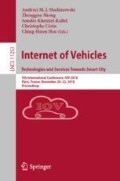Abstract
Urban transportation of next decade is expected to be disrupted by Autonomous Mobility on Demand (AMoD): AMoD providers will collect ride requests from users and will dispatch a fleet of autonomous vehicles to satisfy requests in the most efficient way. Differently from current ride sharing systems, in which driver behavior has a clear impact on the system, AMoD systems will be exclusively determined by the dispatching logic. As a consequence, a recent interest in the Operations Research and Computer Science communities has focused on this control logic. The new propositions and methodologies are generally evaluated via simulation. Unfortunately, there is no simulation platform that has emerged as reference, with the consequence that each author uses her own custom-made simulator, applicable only in her specific study, with no aim of generalization and without public release. This slows down the progress in the area as researchers cannot build on each other’s work and cannot share, reproduce and verify the results. The goal of this paper is to present AMoDSim, an open-source simulation platform aimed to fill this gap and accelerate research in future ride sharing systems.
Access this chapter
Tax calculation will be finalised at checkout
Purchases are for personal use only
Notes
- 1.
- 2.
A particular version of SUMO, called SUMO MESO [2], is intended to reduce the details in vehicle movement simulation. However, we are not aware of any published study on AMoD systems based on SUMO MESO.
References
BlaBla Car. https://www.blablacar.com/
MESO: Mesoscopic version of SUMO. http://sumo.dlr.de/wiki/MESO
OMNeT++. https://www.omnetpp.org/
Toth, P., Vigo, D.: Vehicle Routing. SIAM-MOS, 2nd edn. (2014)
Agatz, N.A.H., Erera, A.L., et al.: Dynamic ride-sharing: a simulation study in metro Atlanta. Transp. Res. B-Method 45(9), 1450–1464 (2011)
Alazzawi, S., Hummel, M., Kordt, P., Sickenberger, T., Wieseotte, C., Wohak, O.: Simulating the impact of shared, autonomous vehicles on urban mobility - a case study of Milan. In: SUMO User Conference (2018)
Alonso-Mora, J., Samaranayake, S., et al.: On-demand high-capacity ride-sharing via dynamic trip-vehicle assignment. PNAS 114(3), 462–467 (2017)
Basu, R., et al.: Automated mobility-on-demand vs. mass transit: a multi-modal activity-driven agent-based simulation approach. Transp. Res. Rec. https://doi.org/10.1177/0361198118758630
Bischoff, J., Maciejewski, M.: Simulation of city-wide replacement of private cars with autonomous taxis in Berlin. In: ANT. Elsevier Masson SAS (2016)
Boesch, P.M., Ciari, F., et al.: Autonomous vehicle fleet sizes required to serve different levels of demand. Transp. Res. Rec. 2542, 111–119 (2016)
Burgstaller, S., Flowers, D., et al.: Rethinking mobility: The ‘pay as you go’ car: ride hailing just the start. Technical report (2017)
Clewlow, R.R., Mishra, G.S.: Disruptive transportation: the adoption, utilization, and impacts of ride-hailing in the United States. Technical report, UC Davis (2017)
Elpern-Waxman, J.: Transportation Terms: Dwell Time (2017)
Hyland, M., Mahmassani, H.: Dynamic autonomous vehicle fleet operations: optimization-based strategies to assign AVs to immediate traveler demand requests. Transp. Res. C-Emer. 92, 278–297 (2018)
Jaeyoung, J., Jayakrishnan, R., et al.: Design and modeling of real-time shared-taxi dispatch algorithms. In: TRB 92nd Annual Meeting (2013)
Jung, J., Jayakrishnan, R., et al.: Design and modeling of real-time shared-taxi dispatch algorithms. In: TRB Annual Meeting, vol. 8 (2013)
Lam, A.Y.S., Leung, Y., et al.: Autonomous-vehicle public transportation system: scheduling and admission control. IEEE Trans. Intell. Transp. Syst. 17(5), 1210–1226 (2016)
Linares, M.P., Montero, L., et al.: A simulation framework for real-time assessment of dynamic ride sharing demand responsive transportation models. In: WSC (2016)
Ma, S., Zheng, Y., et al.: T-share : a large-scale dynamic taxi ridesharing. In: ICDE (2013)
Martinez, L.M., Correia, G.H.A., et al.: An agent-based simulation model to assess the impacts of introducing a shared-taxi system: an application to Lisbon. JAT 49, 475–495 (2015)
Robinson, S.: Measuring bus stop dwell time and time lost serving stop with London ibus automatic vehicle location data. Transp. Res. Rec. 2352(1), 68–75 (2013)
Santi, P., Resta, G., et al.: Quantifying the benefits of vehicle pooling with shareability networks. Proc. Natl. Acad. Sci. 111(37), 13290–13294 (2014)
Skulimowski, A.M.J., Ćwik, A.: Communication quality in anticipatory vehicle swarms: a simulation-based model. In: Peng, S.-L., Lee, G.-L., Klette, R., Hsu, C.-H. (eds.) IOV 2017. LNCS, vol. 10689, pp. 119–134. Springer, Cham (2017). https://doi.org/10.1007/978-3-319-72329-7_11
Vazifeh, M.M., Santi, P., et al.: Addressing the minimum fleet problem in on-demand urban mobility. Nature 557, 534 (2018)
Acknowledgement
This work is supported by the CLARA - CLoud plAtform and smart underground imaging for natural Risk Assessment - project, funded by the Italian Ministry of Education, Universities and Research, within the Smart Cities and Communities and Social Innovation initiative.
Author information
Authors and Affiliations
Corresponding author
Editor information
Editors and Affiliations
Rights and permissions
Copyright information
© 2018 Springer Nature Switzerland AG
About this paper
Cite this paper
Di Maria, A., Araldo, A., Morana, G., Di Stefano, A. (2018). AMoDSim: An Efficient and Modular Simulation Framework for Autonomous Mobility on Demand. In: Skulimowski, A., Sheng, Z., Khemiri-Kallel, S., Cérin, C., Hsu, CH. (eds) Internet of Vehicles. Technologies and Services Towards Smart City. IOV 2018. Lecture Notes in Computer Science(), vol 11253. Springer, Cham. https://doi.org/10.1007/978-3-030-05081-8_12
Download citation
DOI: https://doi.org/10.1007/978-3-030-05081-8_12
Published:
Publisher Name: Springer, Cham
Print ISBN: 978-3-030-05080-1
Online ISBN: 978-3-030-05081-8
eBook Packages: Computer ScienceComputer Science (R0)

